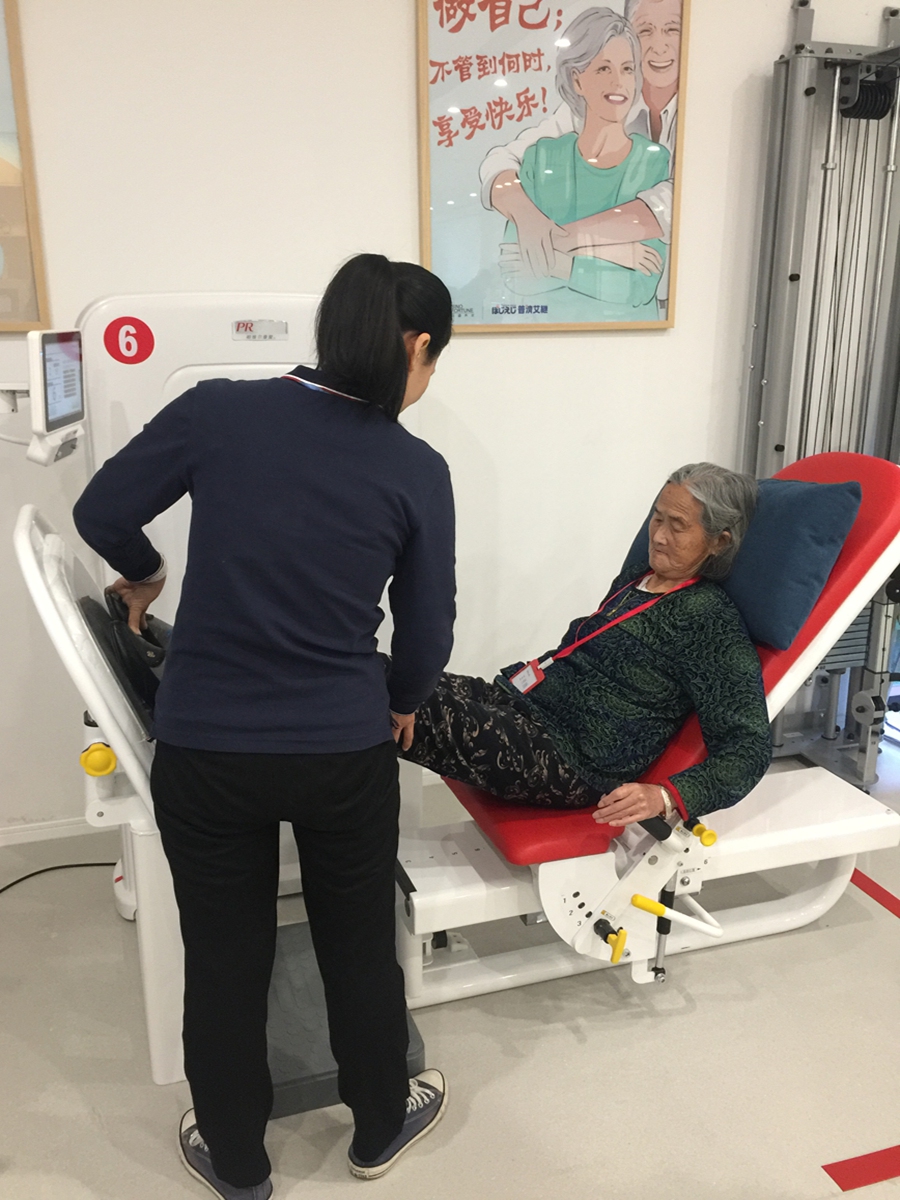Foreign elder caring firms hungry for Chinese market, but challenges exist
Lack of insurance and specialists poses greatest challenges

A nurse takes routine vital signs monitoring for a resident at Merrill Gardens' senior living community in Guilin, South China's Guangxi Zhuang Autonomous Region in 2019 summer. Photo: Courtesy of Merrill Gardens
"I would prefer nursing home when I turn 80 years old instead of being stuck at home with my husband and a nurse," Sun Yahong, 64, a Beijing resident said when thinking of her elderly life.
A previous head of the local women's federation, Sun enjoys group activities. "If I don't have dementia in my 80s, I would play cards or sing with other elderly people in a nursing home, leaving my children free meanwhile enjoying my own life."
The traditional Chinese filial mentality - sending parents to nursing homes means children have acted irresponsibly - has gradually changed in the country which has been moving toward the "moderate aging stage" during the 14th Five Year Plan (2021 - 2025) period.
A number of elderly people similar to Sun now consider spending the autumn of their lives in nursing homes, which has brought tremendous investment opportunities for both domestic and foreign companies.
Market statistics said the scale of China's aged care industry reached 6.91 trillion yuan ($1.06 trillion) in 2019, and is expected to hit 10.29 trillion yuan in 2022.
But entering the lucrative market is not easy. According to Age Life Pro, at least 40 companies from 11 countries have entered Chinese aged care market by the end of 2020, with 44 projects spreading in 17 provinces and regions in China. Among them, more than half came from the US and Japan.
This Global Times reporter recently talked to multiple foreign aged care companies from US, Japan and Europe, and found the lack of insurance for elder caring on a national level in tandem with insufficient specialists and professional training pose two biggest challenges for the industry in China.
Challenges going forward
Foreign companies entering China's aged care sector, like any other industry, find major differences specific to the country.
"For example, there are few resources for people with dementia. The absence of quality care and supportive services for dementia stands to be the greatest challenge the country faces now and, in the future," Cole Wright, Chairman of US company Merrill Gardens China, told the Global Times.
Being in China for 10 years and having consulted and worked on nearly 100 projects across the country, the company found that group activities are more popular and tend to be larger among Chinese elderly people. "Certain activities, like calligraphy, mahjong or KTV, are more popular in China. We can address that with larger activity rooms and specific mahjong rooms that can contain the noise," Wright said.
Being familiar with Chinese culture and Chinese elderly group does not necessarily bring success. Even for Japanese companies which have established mature operation experience at home and share the similar Oriental culture with China found the challenges in running aged care facilities in China are significant.
"China's nursing care insurance is different from what we have in Japan… It doesn't cover all the necessities of the elderly so far," Kanoko Oishi, CEO of MEDIVA Inc, a Japanese healthcare consulting and operation company, told the Global Times.
Wright echoed, saying accepting national health insurance for various services would be a big help. "The central government is working on establishing minimum standards but this will take time. The industry is still in its infancy and it will take several years to mature," he noted.
Another major challenge for foreign companies to operate aged care operations in China is the insufficiency of capable professional staff.
Wright pointed out that employee recruitment and training pose the greatest challenge now and will likely be the biggest challenge going forward.
"The government can expand educational programs for nurses and caregivers. The residents in senior communities often need to leave their homes to obtain simple medical care, temporary rehab, pharmacy and lab work. In the US, residents can receive these services without leaving their home," he said, stressing this is a big area of opportunity in China.
Grace Wang, head of overseas business at Saitama-based Medical Care Service Inc, added that due to the lack of unified qualification standard of elder caring, most of the vocational schools in China train students in their own ways.
"Schools have realized such problem and started to cultivate talent, but it requires time to produce specialists," Wang told the Global Times.

A physical therapist instructs a woman doing leg workouts in a "Positive-age" rehabilitation center in Tianjin on April 15, 2020. Photo: Courtesy of MEDIVA Inc.
Opportunities ahead
Despite the challenges mentioned above, all of the foreign companies said they would love to raise the stake in the Chinese market.
Buurtzorg, a leading European community-based home nursing provider from Holland, sees great opportunities in China's 14th Five Year Plan.
"We consider China's 90-7-3 approach to aged care as an excellent approach. Yet, implementation so far focused mostly on the '3 percent' - building nursing homes, which is the most expensive solution. Thus, China will need a much stronger focus on care at home (90 percent) and in communities (7 percent)," Stephan Dyckerhoff, president of Buurtzorg Asia and Buurtzorg China, told the Global Times.
Building a portfolio of pilot projects in 10 Chinese cities since 2015, including Shanghai, Ningbo, Fuzhou, Chengdu, Anji, and Taipei, Buurtzorg underscored the urgency to cope with the ever-increasing healthcare cost and resource constraints, given the fast decreasing ratio of working population in China.
According to data released by the National Bureau of Statistics, the number of people over the age of 65 reached 175.9 million in 2019, accounting for 12.56 percent of the country's overall population of 1.4 billion.
However, foreign firms have found intense competition together with their Chinese counterparts.
"Chinese elder care companies are making rapid progress. There are no special advantages for foreign companies," Wang said, adding service awareness of domestic companies has improved a lot in recent years.
Looking forward, Oishi expected more Chinese senior citizens could enjoy a status of "posi-age" - a concept where you take aging in a positive way. "You feel good about aging, so you have to be physically or mentally younger than your age. That includes making friends, or doing what you want to do," she added.


